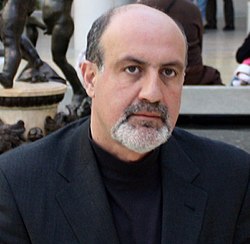Nassim Nicholas Taleb Quote
Try the following experiment. Go to the airport and ask travelers en route to some remote destination how much they would pay for an insurance policy paying, say, a million tugrits (the currency of Mongolia) if they died during the trip (for any reason).Then ask another collection of travelers how much they would pay for insurance that pays the same in the event of death from a terrorist act (and only a terrorist act). Guess which one would command a higher price? Odds are that people would rather pay for the second policy (although the former includes death from terrorism). The psychologists Daniel Kahneman and Amos Tversky figured this out several decades ago.
Try the following experiment. Go to the airport and ask travelers en route to some remote destination how much they would pay for an insurance policy paying, say, a million tugrits (the currency of Mongolia) if they died during the trip (for any reason).Then ask another collection of travelers how much they would pay for insurance that pays the same in the event of death from a terrorist act (and only a terrorist act). Guess which one would command a higher price? Odds are that people would rather pay for the second policy (although the former includes death from terrorism). The psychologists Daniel Kahneman and Amos Tversky figured this out several decades ago.
Related Quotes
For everything in this journey of life we are on, there is a right wing and a left wing: for the wing of love there is anger; for the wing of destiny there is fear; for the wing of pain there is heali...
People accuse me of falling in love easily. It just means that I'm able to see the beauty in most of the people who cross paths with me and I appreciate it for what it is and also for what it isn't. L...
About Nassim Nicholas Taleb
Taleb is the author of the Incerto, a five-volume work on the nature of uncertainty published between 2001 and 2018 (notably, The Black Swan and Antifragile). He has taught at several universities, serving as a Distinguished Professor of Risk Engineering at the New York University Tandon School of Engineering since September 2008. He has also been a practitioner of mathematical finance and is currently an adviser at Universa Investments. The Sunday Times described his 2007 book The Black Swan as one of the 12 most influential books since World War II.
Taleb criticized risk management methods used by the finance industry and warned about financial crises, subsequently profiting from the Black Monday (1987) and the 2008 financial crisis. He advocates what he calls a "black swan robust" society, meaning a society that can withstand difficult-to-predict events. He proposes what he has termed "antifragility" in systems; that is, an ability to benefit and grow from a certain class of random events, errors, and volatility, as well as "convex tinkering" as a method of scientific discovery, by which he means that decentralized experimentation outperforms directed research.
